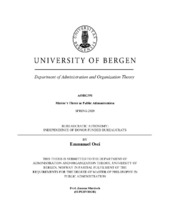BUREAUCRATIC AUTONOMY: INDEPENDENCE OF DONOR FUNDED BUREAUCRATS
Master thesis
Permanent lenke
https://hdl.handle.net/1956/22532Utgivelsesdato
2020-06-11Metadata
Vis full innførselSamlinger
- Master theses [88]
Sammendrag
A scan through available political science and public administration literature points to a global upsurge in studies on bureaucratic autonomy. The predominant focus of most of these studies have been to either establish a framework for conceptualizing the theory of autonomy or to delve into the professionalism and autonomy of certain bureaucrats. This current study seeks to apply the Principal Agency Theory and the Bureaucrat Professionalism Theory to ascertain the independence of the ECOWAS donor funded bureaucrat. The study was qualitative in nature, adopted an exploratory research design and a purposive sampling approach. Structured interviews were administered to 10 respondents comprising 7 donor funded bureaucrat and 3 senior members of ECOWAS who were ‘purposively’ drawn for the study. The results of the study revealed that even though the autonomy of the ECOWAS donor funded bureaucrat is not absolute, they wield a certain level of autonomy that fits both into ‘autonomy of will’ and ‘autonomy of action’. In much the same way, the study established that the ECOWAS donor funded bureaucrat satisfies a significant portion of professionalism standards. Additionally, this study found that Communication flaws, Economic development disparities amongst member countries and Change management are the various impediments to the professionalism of the ECOWAS donor funded bureaucrat. The study, therefore, recommends that ECOWAS should review its 12 months chairmanship tenure which tends to introduce frequent modifications into the management of ECOWAS. Again, the study recommends the establishment of a robust research unit to remedy the situation where bureaucrats struggle to access relevant data to aid decision making. To add to this, ECOWAS should commence negotiations with the professional bodies of the various donor funded bureaucrats to ensure that they implement legislations permitting the application of sanctions to professionals whose conduct falls short of acceptable standards. Purposive sampling (non-probability sampling) was employed in selecting respondents, hence the sampling frame would not have equal chance of being selected. Therefore, the findings of this study cannot be generalized to wider population of donor funded bureaucrats globally. Future research should focus on other unions using different sampling methods. Furthermore, this study employed the Principal Agent Theory (main) and Bureaucratic Professionalism Theory (supporting) in assessing the autonomy of the ECOWAS donor funded bureaucrats. Future research should also focus on the application of other models to understand the level of autonomy of the ECOWAS donor funded bureaucrat
Utgiver
The University of BergenOpphavsrett
Copyright the Author. All rights reservedBeslektede innførsler
Viser innførsler beslektet ved tittel, forfatter og emneord.
-
Policy Implementation of Street Level Bureaucrats: How effectively was the violence against women Act implemented in Minnesota, USA
Eggert, Amy (Master thesis, 2011-06-01)MPA Master's Thesis about the implementation of the Violence Against Women Act of 1994 in Minnesota, United States. -
The Role of Street - Level Bureaucrats in Access to Education. A Case of The Implementation of The Persons With Disability Act of Ghana
Aidoo, Bernice Mary Ansaa (Master thesis, 2016-05-31)The Persons with Disability Act (PWDA) was passed in 2006, to address the needs of persons with disability in Ghana. The act's eight main provisions outline the respective areas in the lives of the persons with disability ... -
Silent politics and unknown numbers: Rural health bureaucrats and Zambian abortion policy
Haaland, Marte Emilie Sandvik; Haukanes, Haldis; Zulu, Joseph; Moland, Karen Marie; Blystad, Astrid (Journal article; Peer reviewed, 2020)This article addresses the gaps between knowledge, policy and practice in reproductive health by exploring the processes involved in translating Zambian abortion policy from paperwork to practice in a predominantly rural ...
